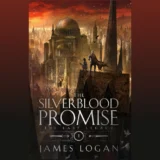
OBIR: Occasional Biased and Ignorant Reviews reflecting this reader’s opinion.

A QUIET AFTERNOON
Published By Grace & Victory Publications, Toronto, Ontario, Canada, in June 2020.
Editors: Liane Tsui and Grace Seybold
Cover Art: Victoria Feistner
Forward – by Laura DeHaan
Review:
Laura and Victoria conceived of a Low-Fi (Low-Stakes Fiction) anthology back in 2019. They were tired of the Hi-Stakes approach in Western SF “with its Earth-shattering consequences and do-or-die protagonists.” Why not fiction where “the stakes are low. The expectations reasonable. The resolutions are quietly satisfactory. Problems are solved with words, not violence.”
How very Canadian! Appeals to me!
And, of course, along came Covid and suddenly life itself is a high-stakes game for everybody. We get to live in a genuine dystopic nightmare, folks! So why not a bit of rational calm to lift everyone’s spirits?
A noble experiment. Let’s see how it works out.
The Baker’s Cat – by Elizabeth Hart Bergstrom
Premise:
Karina’s fondest memories are the wonderful cookies and cakes her mother used to bake. Try as she might, she can’t emulate her mother, can’t realize her dream of becoming a baker. In fact, she can’t be a success at anything. It is as if she’s cursed.
Review:
A pleasant wish-fulfillment fantasy. Turns out not all black cats bring bad luck. Apart from that, the story also brings vividly to life what it must be like to grow up in a household where the baking is near-magical. Evocative. So few live this life nowadays, and never will. A glimpse of times gone past.
An Inconvenient Quest – by Rebecca Gomez Farrell
Premise:
Levolin is a sprite who smells bad. Since sprites eat smells he is unwelcome everywhere, even though their Queen approves of his unique attribute precisely because it is unique. Now she is ill, and he is desperate to find the smell which will save her.
Review:
A charming story with a delightful glimpse of life among sprites involving many original touches I’ve not seen elsewhere. I don’t normally care for this sort of fantasy, but all the details are new to me and that makes this short story an odyssey of discovery. I like clever bits like the methods the sprite sages use to attempt to cure their Queen, such as “Moonberry pie, cat whisker tickles, and bloodletting with skin mites.” This story about sprites is rather sprightly.
Rising Tides – by Mary Alexandra Agner
Premise:
A carnival robot, one leg broken off, has been abandoned on the beach. The tide is coming in. The salt water will kill it. Won’t some human help? The beach seems to be deserted.
Review:
It’s not only robots who are shunned by humans. Not only robots that are considered useless and good for nothing if they don’t perform to spec. Adolescents, too, can be shunned and abandoned even by their peers, maybe especially by their peers. Robots, especially in Japan, are often presented as the ideal friend for those in need. This may well prove to be true, in a manner more subtle and more durable than even robot advocates imagine.
After Bots – by Rachael Maltbe
Premise:
Agatha’s husband Roman took scrap metal and fashioned the pieces into sculptures of robots. An odd form of art but people who came to the shop occasionally bought one. Now Roman was dead. Their daughter Lauren had moved away. Agatha carried on running the store out of habit more than anything else. Sales were few. Nothing much happened. Except, every now and then, one of the outside display sculptures seemed different somehow. Was she going insane?
Review:
The passing of a beloved spouse is difficult to bear. Sometimes memories are not enough. Physical mementos equally useless. Is Agatha losing touch with reality? Possibly. Then again, maybe the deceased are capable of leaving more behind than we assume. Sadness and despair are common responses to grief. This story offers a solution.
It’s All in the Sauce – by Elizabeth Hirst
Premise:
A lover is frustrated since the object of their love is lying. Too busy at work to date? Not at all, hasn’t even been showing up at work. The lover has been betrayed. Could be there is another lover, or maybe the girl is simply bored. At any rate the girl is unobtainable, and dishonest to boot.
Review:
What is a lover betrayed to do? Could it be that self-betrayal is both answer and solution? This is an odd little story, yet rings true psychologically. Ah, the powers of rationalization are infinite, it appears, or at least useful from time to time. Often the solution to our problems lies within ourselves if we but realize it.
Sarah, Spare Some Change – by Ziggy Schultz
Premise:
Everyone has to spend an hour a day separated from their body. That’s the law. But the two Sarah’s, who do not look alike, spend the rest hour alone together in the schoolyard, separate from themselves only in the sense of attempting to understand each other. Bizarre and perverse behaviour which could get them into trouble if caught. And then there’s their habit of indulging in forbidden gambling.
Review:
The mandatory rite of daily astral travel simply serves to contrast with both girls’ desire to be nonconformist and original. Always flout the rules no matter what they are. But today, through gambling, the girls find out why this must be so. Being different from the herd can exact a price, but it can also be a device of affirmation and the key to emotional success. This story explores multiple aspects of the consequences of the desire and need to be different. Makes it seem worthwhile. We’d need further glimpses of their lives to find out if this be true. But at least what happens here offers hope.
Ink Stains – by Tamoha Sengupta
Premise:
Ajay’s father writes in long hand before transferring his finished draft to a keyboard. Ajay likes to steal the ink from the various fresh spills and stains his father leaves in the wake of his creative episodes. Ajay is able to suction the ink into his fountain pen. But what to do with it? More importantly, what does the ink want?
Review:
Anyone familiar with the process of writing novels longhand, as I used to do and some contemporary writers still do, will find this mini-mystery fantasy quite charming. Writing isn’t just all about the writer. The act of writing depends on many things, on mood, setting, but also on quality and appearance of paper, the feel of a keyboard, typewriter, or pen, the physical act of manipulating something with one’s fingers. This story puts emphasis on the ink. It’s very old-fashioned, and I rather like that. This is a story Edgar Allan Poe would approve of. In an era when many writers regard their computer as an adversary, it’s pleasant to be reminded of the older state of symbiotic relationship we used to have with the traditional implements. This story takes writers back to their roots. I call it inspirational. It brings magic back into the art of writing.
Salt Tears and Sweet Honey – by W
Premise:
Netria and Kellis have done well for a married couple. She sometimes wonders if she had remained a Mermaid and he become a Merman how life would have been, not better necessarily, but different, with different pleasures. Still, becoming human to live with a good man had its rewards. Pity they were both getting so old.
Review:
This aspect of mermaid/human interaction I don’t think I’ve seen before. Implies a shapeshifter capability on the part of both species. Bit of a metaphor for mixed marriages of any kind, be they racial or religious or simply different viewpoints. Love conquers all petty problematics. Aging, well, that’s a bit tougher to deal with. A quiet, melancholy story, but not without optimism. Where there remains life, there can still be purpose.
12 Attempts at Telling About the Flower Shop Man (New York, New York)
– by Stephanie Barbé Hammer
Premise:
The shy, young girl enjoyed the flower shop whenever her cheating father decided to buy carnations for his long-suffering wife. The nice young man in training always gave her an extra flower just for her. It helped her endure New York and its frantic but aloof life. Now a mature woman, dare she return in search of the joyous experience of the past?
Review:
A very short story, it reflects the tendency of the self conscious type to overthink social contact, but at least the woman decides to go through with her quest. Possible to read too much into a situation, yes, but also possible to glean a great deal of emotional experience from the smallest of events. The world is full of major themes. Here the focus is on the small, but no less significant for all that. May be an underlying explanation for why so many people are attracted to miniatures. So easy to comprehend. Even in human contact, less can be better.
The Dragon Peddler – by Maria Cook
Premise:
Eleven-year-old David Morris can see the mini-dragons that accompany certain adults. Most people can’t see them. He desperately wants one of his own. So much so that he took $140 from his parents house stash and is off to see the Dragon Peddler. But will she see him?
Review:
To use an old joke, you could say dragons are made of unobtanium as far as David is concerned. Being young, inexperienced, and definitely uneducated in the ways of dragons, he fails to understand just how complex and difficult it is to be deserving of a mini-dragon. They are more than mere pets. There are goals to be obtained before a dragon will take you seriously. David has some growing up to do. But how much and how long will it take?
The story has much to recommend it for placement in a school textbook. It well expresses the frustration every child feels for something they can’t have. It teaches the value of patience and perseverance. And if a mini-dragon sitting on your shoulder isn’t worth the effort I don’t know what would be. Educational, and entertaining.
Tomorrow’s Friend – by Dantzel Cherry
Premise:
Sabrina has gone to the carnival with three friends, except they aren’t her friends and they’ve made her miserable as they usually do when they invite her to join the fun. They’re the best she can do. She longs for a real friend, but she knows it’s not possible. Nobody likes her. Not even the fortune teller who has found her hiding place.
Review:
I’m guessing this is the typical nightmare of every desperate young girl who feels hopelessly out of place. No problem of such identifying with the central character here, I suspect. Makes me wonder what percentage of literature aimed at young girls is fundamentally depressing in that it reminds them of how miserable their own life can be. Particularly depressing for those who are shunned 100% of the time and are happiest when they are alone.
To be sure, solutions can be found in developing self-confidence and taking the initiative, but these are no easy tasks for depressive thinkers whose every experience seems to justify and reinforce their depression. Much depends on the luck of the draw. Sometimes mere happenstance can solve your problems and it turns out the solution wasn’t your responsibility after all. Another way of saying miracles can happen. Truth is, the unexpected can often occur, and sometimes for the good. The lesson? Never give up hope. Your fate isn’t entirely dependent on you alone. A reassuring lesson.
Hollow – with Melissa DeHaan
Premise:
The Mage wars were over long ago. Left behind are numerous hidden treasure vaults protected by assorted types of guardians. Ursa, an accomplished treasure-seeker and looter, has found the greatest vault of all. Trouble is, it is protected by a Hollow, a spectral being with invincible armour. It is a bit unnerving to pass by the skeletal remnants of all those who entered the labyrinth before her. Even more unnerving to find out she’s not alone. There’s another treasure hunter, possibly even more dangerous than the Hollow itself.
Review:
I don’t read much fantasy, so the concept of a post-apocalyptic Mage-war dungeon-search is relatively new to me and therefore intriguing. Yes, it’s a bit of a D&D search, but there are elements of frustration and cynicism in the quest I find refreshing. Also, it’s obvious that questions concerning the true nature of such things as fate, death, and souls are still very much a matter of opinion and not settled even after generations of Mages and magic-users. In short, just because you live in a world filled with magic doesn’t mean you understand reality any better than the people dwelling in a world without magic. I find that concept amusing. The story is amusing. I like it.
Of Buckwheat and Garlic Braids – with Adriana C. Grigore
Premise:
Toma is thinking of leaving the village. At least two of his neighbours are bloodsucking Strigoi, and there may be others. He’s not afraid of them. His problem is they bore him. He wants to learn what other beings infest human settlements elsewhere. At the very least they should be marginally more interesting. Besides, he likes walking long distances in the night.
Review:
This story is an interesting glimpse of Romanian folklore that underlies the modern Vampire myths. To be clear, these beliefs are from a region Romana and Hungry have traded, or I should say conquered, back and forth over many centuries. Call it Eastern European Folklore. It all seems very exotic to us, but is taken for granted by people who live in the region.
The amusing thing about this story is that everyone manages to cope with the supernatural beings, even young children, so that at worst the danger is muted and mostly applies to sheep and chickens. Vampires are a type of vermin, a nuisance, but just something everyone puts up with. They’re sort of the equivalent of the weird relatives you try to prevent company from meeting. Not a danger, more a pain in the neck (pun intended). Some of the interactions are hilarious. The vampire who loves to eat garlic, for instance, even though he’s not immune to its effects. No accounting for taste, I suppose.
I found the story low-key as far as drama or suspense goes, but a most interesting character study, not too mention a fascinating glimpse of small-group dynamics in the face of the supernatural. Most intriguing.
CONCLUSION:
These are all very short stories. Most of them are vignettes. But all of them deliver what was promised. They are quietly intriguing, revelatory of human nature, surprisingly complex for what at first glimpse appears superficially simple, contain many original touches and flashes of humour, and are a lot of fun to read, albeit in a calm and mild fashion that relaxes and pleasures at the same time. Sort of a gentle message suitable for sore mental muscles. Leaves you feeling good, it does.
Check it out at: < Grace and Victory >










